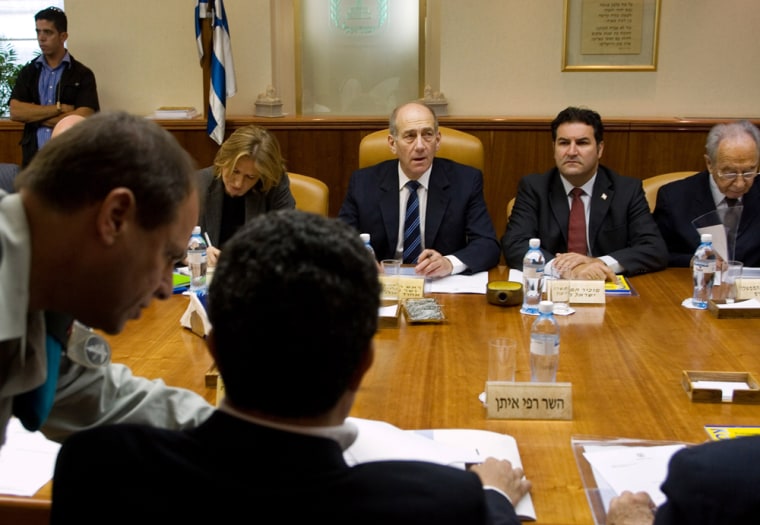Prime Minister Ehud Olmert on Sunday said a planned summit with Mahmoud Abbas has been put on hold because of the Palestinian president’s insistence that Israel release large numbers of Palestinian prisoners — the latest setback for U.S.-led efforts to restart peace talks.
Abbas has denied demanding a prisoner release as a condition for a summit. Israel insists that before it frees any of the estimated 8,000 Palestinians it is holding, a soldier captured in June by Hamas-linked militants in a cross-border raid must be returned.
Olmert announced late last month that he soon hoped to hold a meeting with Abbas, but the preparations bogged down over the prisoners. The two have met only once since Olmert took office in March, an informal chat in Jordan.
“We offered to meet with Abu Mazen, but apparently he is not interested,” Olmert was quoted as telling a Sunday meeting of lawmakers from his Kadima party. Abbas is also known as Abu Mazen.
“He is conditioning a meeting on the release of prisoners and we will not release any prisoners until (captured soldier) Gilad Shalit is released.”
An official who attended the meeting spoke on condition of anonymity because he was not authorized to discuss the matter with reporters.
Saeb Erekat, a Palestinian lawmaker who is close to Abbas, said preparations remain on track. “The efforts to schedule a meeting are still ongoing, and both sides are determined to ensure a successful meeting,” he said.
Other roadblocks
Still, the disagreements over prisoners and a summit are not the main impediments to diplomatic progress.
Internal Palestinian and Israeli political turmoil and control of the Palestinian government by the extremist Islamic group Hamas are larger obstacles in the way of U.S. efforts toward peace talks, which have been stalled for six years.
Hamas won Palestinian parliamentary elections in January. Israel has boycotted the militant group, which is committed to the destruction of the Jewish state, but considers Abbas an acceptable negotiating alternative.
Secretary of State Condoleezza Rice was in the region this month to try to prop up Abbas, leader of the moderate Fatah Party that was ousted by Hamas in the January elections. Abbas was elected separately a year earlier and remains in office, but his power and influence have been severely curtailed.
Olmert bars talks with Syria
Olmert also rejected Sunday the possibility of talks with Syrian President Bashar Assad, saying Assad was responsible for harboring terrorists and was attempting to destabilize the entire region, according to the official who attended the meeting.
Israel has accused Syria of providing weapons to Hezbollah guerrillas before and during the recent war in Lebanon. Olmert said that since an Aug. 14 cease-fire went into effect, Syria has continued to meddle in Lebanese affairs and tried to undermine the country’s pro-Western leader.
Assad told the German magazine Der Spiegel last month “we want to make peace — peace with Israel.” In an interview with the British Broadcasting Corp. broadcast last week, Assad said it remained to be seen whether Israel had the will to make peace.
Israel has been carrying out a widespread offensive in Gaza since Cpl. Gilad Shalit was captured. Israeli forces have killed 21 Palestinians in fighting since Thursday. Most of the dead were militants, but two minors, ages 10 and 14, and a 29-year-old woman also were killed.
Israel says the latest raid is aimed at targeting the repeated fire of homemade rockets from the northern Gaza Strip. “We cannot allow ourselves to accept this pace of rocket fire,” Olmert said in Sunday’s Cabinet meeting. Several rockets have landed in southern Israel; no serious injuries have been reported.
Israel blames Hamas for weapons smuggling
During the Cabinet meeting, senior military officials said they believe Hamas has smuggled anti-aircraft weapons into Gaza for the first time, participants said. If true, this could pose a serious challenge to Israel, which relies heavily on its air force to attack militants in Gaza.
Israeli government spokeswoman Miri Eisen said the weapons are coming from Iran and “other countries that sell them.” She was concerned that Palestinian militants are learning “how to use the new weapons, and especially how the Palestinians can fight against Israel the way that Hezbollah fought in Lebanon.”
Abbas has been trying to pressure Hamas to moderate its views, but efforts to form a national unity government — which could lead to new peace talks — have stalled. The militants have demanded the release of hundreds of Palestinians jailed by Israel.
Nevertheless, Olmert said he hoped a summit would lead to broader peace talks. Negotiations have been frozen for years, with both sides refusing to carry out their initial obligations under the internationally backed “road map” peace plan.
During Rice’s visit early this month, Olmert reportedly promised to “create a better environment” and return to peacemaking.
